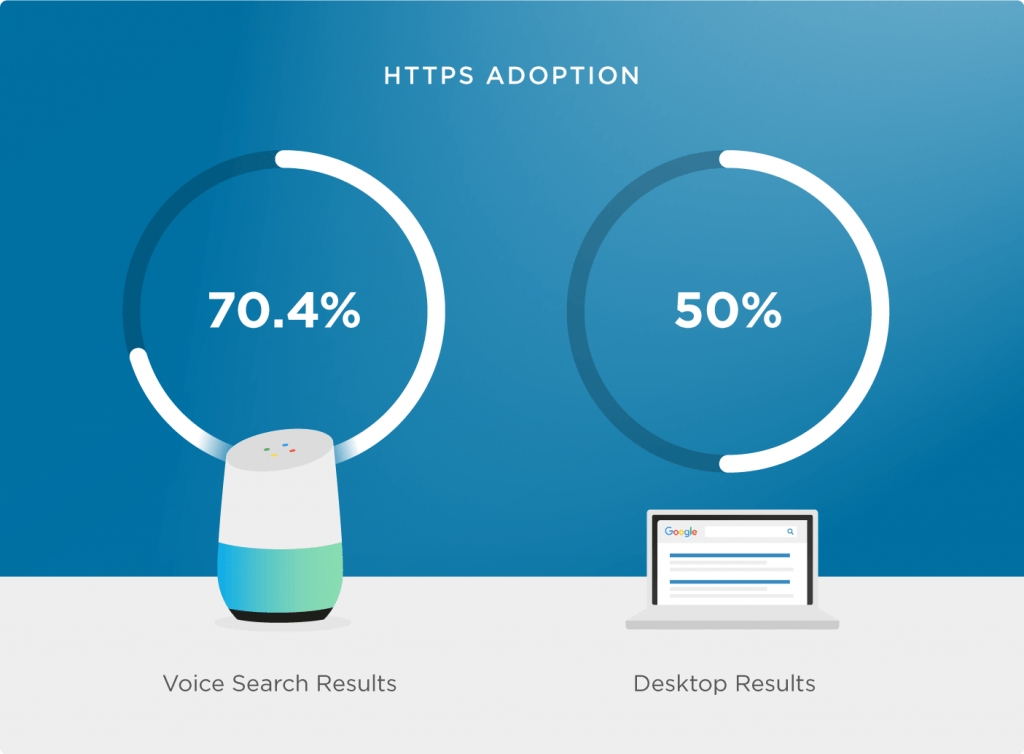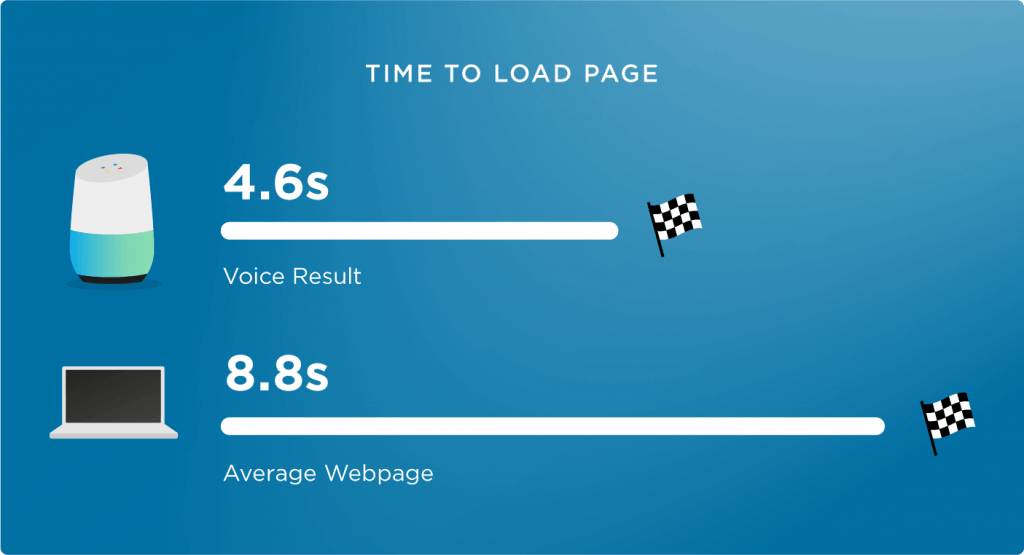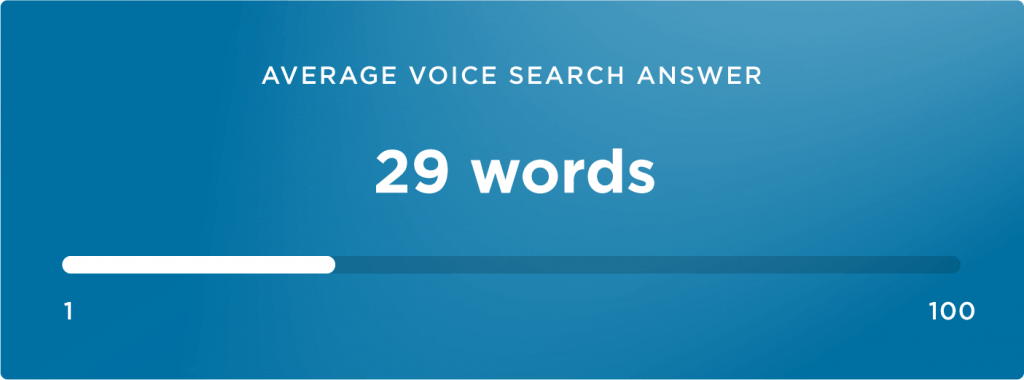6 Tips for Optimising your site for Voice Search in 2019


In recent years, many have seen voice search and virtual assistants as a fun feature where they could ask Alexa to sing ‘Baby Shark’, get Cortana to tell you a joke or have Siri tell them what is 0÷0. Voice search is now getting the attention it deserves as it is tipped to be one of the biggest digital trends of 2019, changing the way we search online. Nearly everyone has access to a virtual assistant such as Alexa, Siri, Google or Cortana whether it be on their smartphone, tablet or smart home device. The last 12 months has also seen a huge increase in smart speaker sales in the United States which is a trend that the rest of the world is sure to follow. According to TechCrunch.com, “One in six Americans now own a smart speaker, a figure that’s up 128 percent from January 2017.”
In 2018, Google CEO Sundar Pichai unveiled a brand-new voice assistant that was able to carry out daily tasks over the phone such as booking a hair salon appointment or making reservations at a restaurant.
According to Forbes.com, 67 million voice assisted devices will be in use in 2019 in the US alone while Forbes also claim that by 2020, nearly 30% of all website sessions will be conducted without a screen. Research has found that 58% of consumers have used voice search to find local business information within the last year while 27% of users visit the website of a business after conducting a voice search. These forecasts and reports show that it is worthwhile to take voice search seriously and to make sure you optimise your site for voice search.
Here we have our top 6 tips on optimising your site for Voice Search in 2019:
Web browsers usually display a padlock icon to show that HTTPS is active on a site. Once https is active on a site, the communication between your browser and the website are encrypted.
Having HTTPS active on your site can help improve your organic rankings as BlueCorona.com state that over 40% of sites on the first results page on Google are HTTPS. HTTPS is even more crucial for voice search as sites with HTTPS active on them also dominate Google’s voice search results as Backlinko found that 70.4% of Google’s voice search result pages are secured with HTTPS.

Page speed is a huge factor in making sure your site is optimised for voice search. According to backlinko.com, the average voice search result page loads in 4.6 seconds. Focusing on speed will have a positive effect when optimising your site’s pages for voice search. You can review your site’s speed by putting your site’s URL into Google Page Speed Insights or Pingdom which will highlight elements on your website that are slowing down performance. Make a note of the elements slowing down your site and take action to correct these errors such as compressing image sizes, minimising redirects, reducing DNS lookups as well as others.

Credit to – https://backlinko.com/voice-search-seo-study
Domain Authority is crucial for anyone looking to optimise their site for voice search. Google needs to be 100% confident in the results that any virtual assistant device (Alexa, Siri, Cortana or Google) calls out is accurate, relevant and helpful. This means that Google relies heavily on analysing domain authority when considering which site to use in response to voice search queries. The higher your domain authority is, the more likely your site is to be chosen by Google to respond to a voice search query.
The most effective way of improving your domain authority is through improving your link building strategy. You can do this by reaching out to high authority sites as well as sites related to yours and ask them to link to your site. It is also important to make sure that your site does not have any toxic links which may be directing to your site. You can do this quickly and easily by carrying out a backlink audit on SEMRush.
According to Crucial.com, 39% of voice searches are queries relating to local businesses such as restaurants, hotels, shops, local services etc. This means that if you own a local business or service, optimising your site for voice search should be an SEO priority for you in 2019. The best way to make sure that your company’s site is optimised for voice search is to make sure you have claimed your Google My Business listing. The most important elements that you need to include in your Google My Business profile will be your business name, phone number, email address and business address. It is also important to associate your Google My Business listing with the most relevant categories.
With 300% more voice than text searches for local queries last year, localisation is an important trend to jump on when it comes to being voice optimised. Search combinations such as “open now”, “near me”, “tonight”, “to buy” or “now” are growing at an exponential rate so think about activities, centres or visitors attractions near you. Showcase what your area has to offer and make it even more desirable to come and visit. Be SEO-friendly for your local market.

Featured snippets are a result format on Google result pages which provide users with short and specific answers to questions without the user having to click on a result. Featured snippets could prove to be crucially important as Google Home and Google Assistant devices often read from featured snippets when providing answers to voice search queries. To aim for your site’s content and URL to be included in a featured snippet, you must use specific and concise language in your on-site content. When writing meta-descriptions for websites, ensure that the text is optimised for speech so that it reads better out loud rather than the more rigid point-to-point strict text-based search approach. When your content is direct and concise, you increase your chances of being included in a featured snippet and this in turn will increase your site’s chance to be used as a voice search result.

‘Content is King’ is a common phrase in the world of SEO and it seems as though this is also the case when it comes to optimising your site for voice search. According to backlinko.com, content that ranks highly in desktop search is also very likely to appear as a voice search answer as they state that, “Approximately 75% of voice search results rank in the top 3 for that same query on desktop”.
Forbes.com notes that for voice search optimisation, a site needs content that ‘talks back’. This means your site needs content that answers the type of questions that people are asking. You can do this quickly by asking yourself what are the most common questions that people ask you about your business or service. Providing content that best matches the user’s search intent will clearly win the race but not if Google cannot understand it. It is also important that you keep the sentences within your content short and direct as Crucial.com state that, “An average response for a voice search query should be no longer than 29 words”. Make your content easy and clear for virtual assistants to pull excerpts from your page and serve up to its users.

In conclusion, optimising your site for voice search is crucial for anyone who wants to compete online in 2019. Optimising your site for voice search should be an easy task for anyone who already has a successful SEO strategy in place and has looked after the crucial tasks of HTTPS, site speed and domain authority. Once you have these vital tasks taken care of, you should look at putting as much relevant information into your Google My Business listing so you have a chance of being top of the pile for local voice search. Relevant, direct and concise content on your site will increase your chances of appearing in voice search but it is essential that you create content that ‘talks back’. After all, as Albert Creixell (Amazon Alexa Partnerships Head) stated, “Utterances are the new hashtags.”
Core Optimisation is a performance-based digital agency which helps you grow your online revenue. Our starting point is always you. We get to know your brand from the inside out and the outside in. If you’re interested in learning more give us a shout!